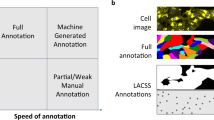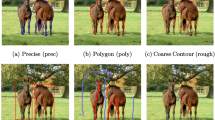Abstract
Deep learning algorithms for image segmentation typically require large data sets with high-quality annotations to be trained with. For many domains, the annotation cost for obtaining such sets may prove to be prohibitively expensive. Our work aims to reduce the time necessary to create high-quality annotated images by using a relatively small well-annotated data set for training a convolutional neural network to upgrade lower-quality annotations, produced at lower annotation costs. We apply our method to the task of cell segmentation and investigate the performance of our solution when upgrading annotation quality for labels affected by three types of annotation errors: omission, inclusion, and bias. We observe that our method is able to upgrade annotations affected by high error levels from 0.3 to 0.9 Dice similarity with the ground-truth annotations. Moreover, we show that a relatively small well-annotated set enlarged with samples with upgraded annotations can be used to train better-performing segmentation networks compared to training only on the well-annotated set.
Access this chapter
Tax calculation will be finalised at checkout
Purchases are for personal use only
Similar content being viewed by others
References
Araújo, R.J., Cardoso, J.S., Oliveira, H.P.: A deep learning design for improving topology coherence in blood vessel segmentation. In: Shen, D., Liu, T., Peters, T.M., Staib, L.H., Essert, C., Zhou, S., Yap, P.-T., Khan, A. (eds.) Medical Image Computing and Computer Assisted Intervention – MICCAI 2019: 22nd International Conference, Shenzhen, China, October 13–17, 2019, Proceedings, Part I, pp. 93–101. Springer, Cham (2019). https://doi.org/10.1007/978-3-030-32239-7_11
Can, Y.B., Chaitanya, K., Mustafa, B., Koch, L.M., Konukoglu, E., Baumgartner, C.F.: Learning to segment medical images with scribble-supervision alone. In: Stoyanov, D., et al. (eds.) DLMIA/ML-CDS -2018. LNCS, vol. 11045, pp. 236–244. Springer, Cham (2018). https://doi.org/10.1007/978-3-030-00889-5_27
Casser, V., Kang, K., Pfister, H., Haehn, D.: Fast mitochondria detection for connectomics. In: Arbel, T., Ayed, I.B., de Bruijne, M., Descoteaux, M., Lombaert, H., Pal, C. (eds.) MIDL 2020. Proceedings of Machine Learning Research, vol. 121, pp. 111–120. PMLR (2020)
Chen, S., Juarez, A.G., Su, J., van Tulder, G., Wolff, L., van Walsum, T., de Bruijne, M.: Label refinement network from synthetic error augmentation for medical image segmentation. CoRR abs/2209.06353 (2022)
Creswell, A., White, T., Dumoulin, V., Arulkumaran, K., Sengupta, B., Bharath, A.A.: Generative adversarial networks: an overview. IEEE Signal Process. Mag. 35(1), 53–65 (2018)
Dai, W., Dong, N., Wang, Z., Liang, X., Zhang, H., Xing, E.P.: SCAN: structure correcting adversarial network for organ segmentation in chest x-rays. In: Stoyanov, D., et al. (eds.) DLMIA/ML-CDS -2018. LNCS, vol. 11045, pp. 263–273. Springer, Cham (2018). https://doi.org/10.1007/978-3-030-00889-5_30
Diem, K., Magaret, A.S., Klock, A., Jin, L., Zhu, J., Corey, L.: Image analysis for accurately counting cd4+ and cd8+ t cells in human tissue. J. Virol. Methods 222, 117–21 (2015)
Feng, R., et al.: Interactive few-shot learning: limited supervision, better medical image segmentation. IEEE Trans. Med. Imaging 40(10), 2575–2588 (2021)
Feyjie, A.R., Azad, R., Pedersoli, M., Kauffman, C., Ayed, I.B., Dolz, J.: Semi-supervised few-shot learning for medical image segmentation. arXiv preprint arXiv:2003.08462 (2020)
Greenwald, N.F., et al.: Whole-cell segmentation of tissue images with human-level performance using large-scale data annotation and deep learning. Nat. Biotechnol. 40(4), 555–565 (2022)
Kamath, U., Liu, J., Whitaker, J.: Deep Learning for NLP and Speech Recognition. Springer, Cham (2019). https://doi.org/10.1007/978-3-030-14596-5
Kingma, D.P., Ba, J.: Adam: A method for stochastic optimization. In: Bengio, Y., LeCun, Y. (eds.) ICLR 2015 (2015)
Lucchi, A., Smith, K., Achanta, R., Knott, G., Fua, P.: Supervoxel-based segmentation of mitochondria in EM image stacks with learned shape features. IEEE Trans. Medical Imaging 31(2), 474–486 (2012)
Matuszewski, D.J., Sintorn, I.M.: Minimal annotation training for segmentation of microscopy images. In: ISBI 2018, pp. 387–390. IEEE (2018)
Min, S., Chen, X., Zha, Z.J., Wu, F., Zhang, Y.: A two-stream mutual attention network for semi-supervised biomedical segmentation with noisy labels. In: AAAI. vol. 33, pp. 4578–4585 (2019)
Minaee, S., Boykov, Y., Porikli, F., Plaza, A., Kehtarnavaz, N., Terzopoulos, D.: Image segmentation using deep learning: a survey. IEEE Trans. Pattern Anal. Mach. Intell. 44(7), 3523–3542 (2022)
Nie, D., Gao, Y., Wang, L., Shen, D.: ASDNet: attention based semi-supervised deep networks for medical image segmentation. In: Frangi, A.F., Schnabel, J.A., Davatzikos, C., Alberola-López, C., Fichtinger, G. (eds.) MICCAI 2018. LNCS, vol. 11073, pp. 370–378. Springer, Cham (2018). https://doi.org/10.1007/978-3-030-00937-3_43
Paszke, A., et al.: Pytorch: An imperative style, high-performance deep learning library. In: NeurIPS 2019, pp. 8024–8035 (2019)
Peng, L., et al.: Semi-supervised learning for semantic segmentation of emphysema with partial annotations. IEEE J. Biomed. Health Inform. 24(8), 2327–2336 (2020)
Rajchl, M., et al.: Deepcut: object segmentation from bounding box annotations using convolutional neural networks. IEEE Trans. Med. Imaging 36(2), 674–683 (2017)
Rey, D., Neuhäuser, M.: Wilcoxon-signed-rank test. In: Lovric, M. (ed.) International Encyclopedia of Statistical Science, pp. 1658–1659. Springer (2011)
Ronneberger, O., Fischer, P., Brox, T.: U-Net: convolutional networks for biomedical image segmentation. In: Navab, N., Hornegger, J., Wells, W.M., Frangi, A.F. (eds.) Medical Image Computing and Computer-Assisted Intervention – MICCAI 2015: 18th International Conference, Munich, Germany, October 5-9, 2015, Proceedings, Part III, pp. 234–241. Springer, Cham (2015). https://doi.org/10.1007/978-3-319-24574-4_28
Svoboda, D., Kozubek, M., Stejskal, S.: Generation of digital phantoms of cell nuclei and simulation of image formation in 3D image cytometry. Cytometry Part A 75A (2009)
Voulodimos, A., Doulamis, N., Doulamis, A.D., Protopapadakis, E.: Deep learning for computer vision: a brief review. Comput. Intell. Neurosci. 2018, 7068349:1–7068349:13 (2018)
Vădineanu, S., Pelt, D.M., Dzyubachyk, O., Batenburg, K.J.: An analysis of the impact of annotation errors on the accuracy of deep learning for cell segmentation. In: Proceedings of The 5th International Conference on Medical Imaging with Deep Learning. Proceedings of Machine Learning Research, vol. 172, pp. 1251–1267. PMLR (06–08 Jul 2022)
Yang, Y., Wang, Z., Liu, J., Cheng, K.T., Yang, X.: Label refinement with an iterative generative adversarial network for boosting retinal vessel segmentation. arXiv preprint arXiv:1912.02589 (2019)
Zhang, L., et al.: Disentangling human error from ground truth in segmentation of medical images. Adv. Neural. Inf. Process. Syst. 33, 15750–15762 (2020)
Zhang, M., et al.: Characterizing label errors: confident learning for noisy-labeled image segmentation. In: Martel, A.L., et al. (eds.) Medical Image Computing and Computer Assisted Intervention – MICCAI 2020: 23rd International Conference, Lima, Peru, October 4–8, 2020, Proceedings, Part I, pp. 721–730. Springer, Cham (2020). https://doi.org/10.1007/978-3-030-59710-8_70
Acknowledgment
This research was supported by the SAILS program of Leiden University. DMP is supported by The Netherlands Organisation for Scientific Research (NWO), project number 016.Veni.192.235.
Author information
Authors and Affiliations
Corresponding author
Editor information
Editors and Affiliations
1 Electronic supplementary material
Below is the link to the electronic supplementary material.
Rights and permissions
Copyright information
© 2023 The Author(s), under exclusive license to Springer Nature Switzerland AG
About this paper
Cite this paper
Vădineanu, Ş., Pelt, D.M., Dzyubachyk, O., Batenburg, K.J. (2023). Reducing Manual Annotation Costs for Cell Segmentation by Upgrading Low-Quality Annotations. In: Xue, Z., et al. Medical Image Learning with Limited and Noisy Data. MILLanD 2023. Lecture Notes in Computer Science, vol 14307. Springer, Cham. https://doi.org/10.1007/978-3-031-44917-8_1
Download citation
DOI: https://doi.org/10.1007/978-3-031-44917-8_1
Published:
Publisher Name: Springer, Cham
Print ISBN: 978-3-031-47196-4
Online ISBN: 978-3-031-44917-8
eBook Packages: Computer ScienceComputer Science (R0)




